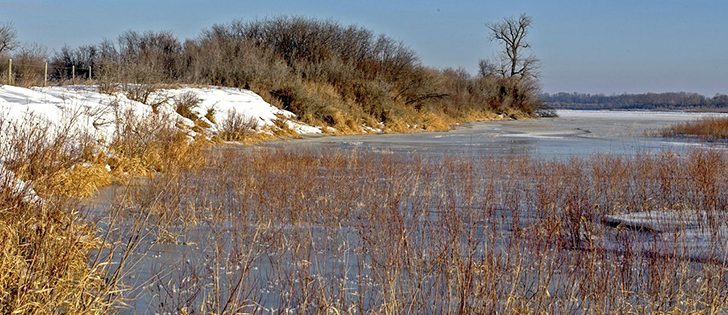Lake Friendly label one solution | Program would help Manitoba farmers assure consumers they care for the environment
Dan Mazier wasn’t looking for trouble when he walked into a downtown Brandon coffee shop this fall.
When the Brandon-area farmer ordered coffee, the server asked about the Lake Friendly button on his jacket.
Mazier, who is vice-president of Keystone Agricultural Producers, ex-plained it is a program for all Manitoba residents, including farmers, who want to protect and preserve the water quality of Lake Winnipeg.
“Oh. Farmers. They put pesticides in the rivers and they contaminate our environment, so they wouldn’t want to be (part of) that,” Mazier said, recalling the waitresses’ comment.
Read Also

Canola oil transloading facility opens
DP World just opened its new canola oil transload facility at the Port of Vancouver. It can ship one million tonnes of the commodity per year.
“That just blew me away. I didn’t even tell her that I farm.”
Mazier said he was tempted to throw hot, brown liquid at the server in the heat of the moment, but after calming down, he realized such comments show that farmers are in a public relations battle for the hearts and minds of urban residents.
“We’re inundated with statements like that … and we have nothing (to) demonstrate how we’re doing the right things.”
With that in mind, KAP is collaborating with Lake Friendly leaders to establish a certification system for agriculture. Producers who adhere to practices that protect Manitoba’s streams, rivers and lakes can erect a sign on their farm. As well, agricultural products from their farms could receive a Lake Friendly label.
At the very least, the program allows producers to say agriculture is part of the solution and it might change the urban narrative, Mazier said.
“If you look at how commercial farming is portrayed … organic is good and commercial is bad,” he said.
“Farmers, the majority of them, want to do the right thing and want to be given the tools (to do the right thing).”
Massive algal blooms began forming on Lake Winnipeg in the mid-2000s, and the green water that crashed onto the lake’s beaches provoked media reports of a dying lake and public fury. In response, the provincial government imposed strict restrictions on hog barn development and fertilizer application, pointing a finger of blame at agriculture.
KAP president Doug Chorney said the lake crisis and the government response scarred agriculture’s reputation.
“I think a lot of damage has been done to our social license,” he said.
“That’s our whole impetus for our desire to go for the Lake Friendly alliance.”
Colleen Sklar, executive director of Lake Friendly, said the organization is still developing a designation-certification program for farmers who adopt practices that preserve water quality.
“We’re getting a little bit closer, but what we’re really looking for right now is partners,” she said from her office in Clandeboye, Man.
“We’ve been in talks with different groups: the pork producers, we’ve been in talks with Agrium and a whole bunch of organizations like that.”
In the short run, Sklar said she is focused on building the Lake Friendly brand. Consumers won’t seek out products with a Lake Friendly label or understand how farmers are making a difference if they aren’t aware of the brand.
“We’re in the process of trying to develop a full-scale marketing campaign,” she said.
“If we can get the funding for it, we will be (launching) it this summer…. We’re trying to do (this) methodically and do it right the first time.”


















